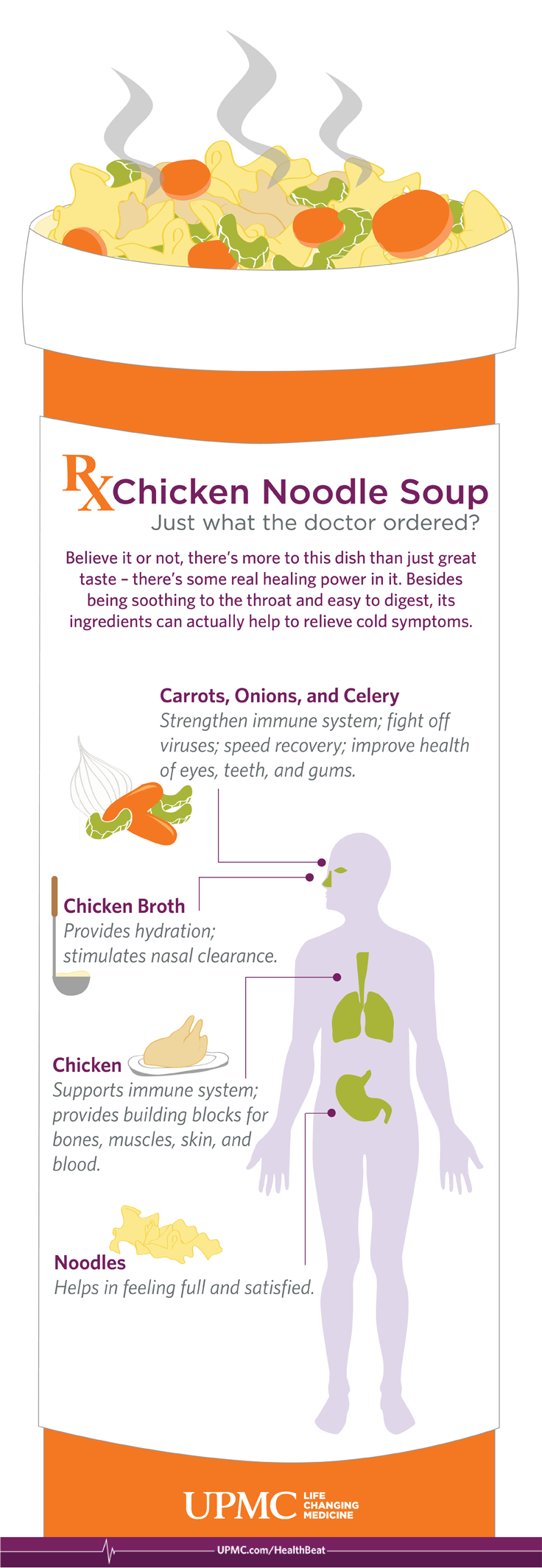What’s in Chicken Noodle Soup?
These few ingredients will easily make a tasty bowl of chicken noodle soup, though there are many variations available:
- Chicken broth: This filling soup has fat, vitamins, and minerals. The hot beverage can help with upper respiratory symptoms by promoting nasal clearance and keeping you hydrated.
- Carrots, celery, and onions are vegetables rich in antioxidants and vitamins A and C. These nutrients aid in strengthening the immune system and thwarting viral invasion. They may help the body recover faster from an illness.
- The dish’s star, chicken, supplies protein and strengthens the immune system.
- Noodles: Packed with carbohydrates, these foods make you feel content and full.
- Herbs (optional): To strengthen your immune system and add more flavor and antioxidants, try using herbs like dill, thyme, bay leaf, or parsley.

What Are the Health Benefits of Chicken Noodle Soup?
When you’re feeling under the weather, a hot, comforting bowl of chicken noodle soup is exactly what the doctor ordered. In addition to adding flavor, the ingredients in chicken noodle soup have several health advantages.
In addition to providing electrolytes like sodium, potassium, and magnesium, the broth is hydrating. That’s especially beneficial if you’re feverish and at risk of dehydration. Additionally, the steam from hot broth helps facilitate easier breathing by opening up nasal passages.
Light, simple to digest, and incredibly nourishing is chicken noodle soup. It gives you just the right amount of nutrients to sustain your energy when you’re not in the mood to eat. A one-cup serving of homemade chicken soup has:
- About 150 calories.
- 13 grams of protein.
- 5 grams of fat.
- 12 grams of carbs.
In addition to protein, it offers antioxidants, zinc, vitamin A, vitamin C, and other nutrients that support your immune system. The diverse array of nutrients is crucial as they collaborate to facilitate your body’s healing process. Feel free to add more nutritious ingredients to your soup if you want to benefit even more from it. Some good choices include:
- Ginger or cayenne pepper. The spiciness helps decrease congestion.
- Lemon juice. It adds more vitamin C.
- Garlic. It has antibacterial and antiviral properties.
- Leafy greens. They contribute more immune-boosting antioxidants.
You can add as many or as few ingredients as you like to make chicken noodle soup, which is its beautiful quality. When you begin to feel better, you can add more chicken or a can of beans to your soup to make it heartier. It’s an easy way to transition back to regular meals.
Other theories claim that chicken soup helps keep you hydrated and soothes a sore throat. But a recent study from the University of Nebraska found that chicken soup may contain anti-inflammatory substances that could help alleviate a cold.
Various vegetables and stock or broth are used to make chicken soup. The chicken bones are cooked for several hours in a stock. This allows minerals like magnesium, calcium, phosphorus, zinc, and seepage into the liquid stock. Since a broth is usually made solely of meat, these same minerals won’t be present in it. However, don’t undervalue broth’s nutritional value; it’s still packed with minerals like phosphorus and selenium. Naturally, a range of vegetables are used to make stocks and soups, including celery, onions, carrots, leeks, parsnips, and turnips; all of these vegetables’ minerals seep into the liquid.
Jewish scholars have praised chicken soup’s healing properties for a range of illnesses, including the common cold, since the 12th century. Even now, when you’re sick in bed, someone has brought you a steaming hot bowl of soup or reminded you of its benefits. Do folktales about the health benefits of chicken soup truly exist, or is there a more plausible way to treat a cold?
According to a few scientific studies, zinc can help shorten the length of a cold. Nevertheless, you must begin taking more zinc within 24 hours of the onset of symptoms. It’s difficult to determine whether chicken soup contains enough zinc to be beneficial because many of these studies were conducted with lozenges or supplements.
Another comfort food that’s frequently given to sick children is chicken soup. Both adults and children may benefit emotionally and psychologically from a steaming bowl of soup.
